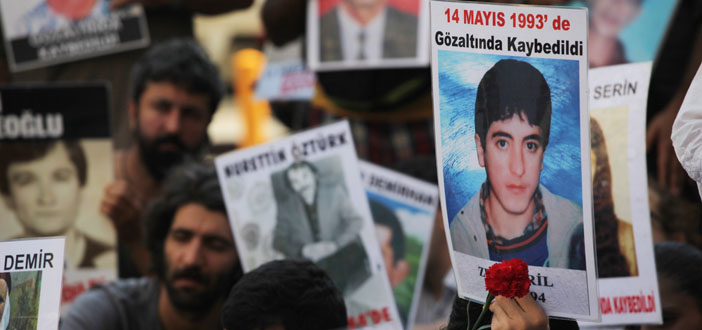The period of limitation is about to end for many lawsuits regarding enforced disappearances and unsolved murders. If a step is not taken, these files will be closed. The Human Rights Association and the Saturday Mothers have launched a new campaign against the threat imposed by the statute of limitations.
Turkey’s recent history is also a history of unsolved and mass murders. Enforced disappearances that began in the aftermath of the 1980 military coup, became a systematic State policy in the 1990s especially in the predominantly Kurdish region of South-eastern Anatolia. Hundreds of people were forcibly disappeared by law enforcement officials. Recently, many mass graves have been discovered. And every Saturday, people in many parts of Turkey gather to voice their demand to know the fate of their lost ones. No concrete step has been taken regarding the gross right violations perpetrated for decades. Investigations and cases continue without any serious progress. Systematic rights violations are now exacerbated with a systematic attempt to close the relevant files. Many enforced disappearance cases that have become the symbol of the struggle of the relatives of the forcibly disappeared now face the danger of lapse of time due to the statute of limitations.
The Human Rights Association (İHD) and the Saturday Mothers, that have led the struggle against human rights violations for many years, have launched a campaign against the implementation of the statute of limitations. They demand effective investigation, and the annulment of the statute. The campaign began on 4 February 2015, Wednesday, with a press conference held at Cezayir Istanbul.
The judiciary has failed to fulfil its duty
Sebla Arcan, member of the İHD Commission Against Enforced Disappearances, introduced the campaign by stating that impunity was a tradition created by the collaboration of every level of the State in Turkey, and that one of the main reasons of impunity was the failure of the judiciary to fulfil its duty. Arcan added that this view was also expressed in the related rulings of the European Court of Human Rights.
Arcan also drew attention to the danger of time lapse, saying, “Because of the statute of limitations, verdicts of non-prosecutions are being given in cases of crimes against humanity, which is a violation of universal law. If no emergency regulation is introduced, like thousands of other files, enforced disappearance files will also soon be closed and the perpetrators of these crimes will not be held accountable”. Arcan called for the introduction of the universal rule of not applying the statute of limitation and amnesty laws for crimes against humanity.
Erdoğan did not keep his promise
İHD Chairperson Öztürk Türkdoğan, referring to the meeting President Recep Tayyip Erdoğan held with the Saturday Mothers, said, “Erdoğan made a promise at that meeting. Turkey was to become party to the UN Convention for the Protection of all Persons from Enforced Disappearance (ICCPED). Turkey was to recognize the jurisdiction of the International Criminal Court. Yet it still has not. I ask them, what are you waiting for?”
Türkdoğan added that they had applied to the Constitutional Court regarding the case of Hasan Gülünay, who was forcibly disappeared in 1992, and whose file had been closed in 2012 because of lapse of time, and expected the high court to rule for the inapplicability the verdict of closing due to the statute of limitations.
Symbol cases threatened by statute of limitations
There are tens of cases threatened by the expiry of the 20-year period defined by the statute of limitations. The symbol cases of Hasan Ocak, Rıdvan Karakoç and Murat Yıldız will be under threat of expiry from next month on, while the case file of Hayrettin Eren, who was forcibly disappeared in 1980, was closed last week due to the statute of limitations.
Fate of 67% of cases remains unknown
According to data provided by the Truth Justice Memory Centre, 69% of crimes committed due to the state’s enforced disappearance policy implemented as an ‘anti-terror’ method by the State, that have been submitted to jurisdiction were abandoned during the investigation process. Of these, 17% remain as open cases, 7% were given verdicts of non-prosecution, 2% were closed due to time lapse and 4% ended in acquittal. A verdict of conviction was issued in only 1% of the cases. However, in 78% of the cases submitted to the European Court of Human Rights, a verdict of violation against the Republic of Turkey was issued. In 9% of the cases the ECHR proposed an amicable settlement. An average of 19 years 9 months has passed since the opening of the files examined, revealing that a great majority of these files face the risk of closure due to the 20-year duration imposed by the statute of limitations. Besides, despite the considerable time that has passed since the violations, the fate of 67% of the forcibly disappeared has not been determined yet. The remains of 27% of the persons involved have been discovered and turned over to their families, whereas although the remains of 6% of the persons involved were found, it was determined that they had been interred in common graves without their families being informed.





